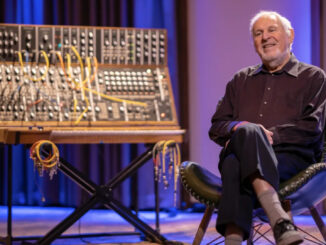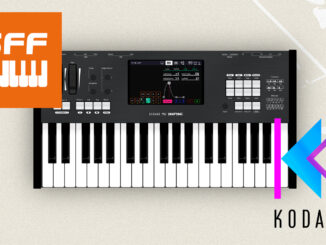inMusic, the parent company of Akai Pro, Alesis, Air Music Tech… has acquired Moog Music and promises future new groundbreaking instruments.
You’re sitting in the office in very hot temperatures and think: “okay, the companies are now on summer vacation, so it’s quieter with new releases. Wrong, very surprised now came huge news.
After Sequential and Oberheim were acquired by Focusrite, another iconic brand is now changing hands. Moog Music is joining inMusic, which owns many companies like Akai Pro, Alesis, Air Music, Numark, etc.
Personal Input
That’s a big step for Moog, previously owned by employees. It is unknown what the plan of inMusic CEO Jack O’Donnell is and where he wants to take Moog Music. But he promises many groundbreaking instruments for the future.
I could be that he would also like to open the market to musicians with a smaller budget. Also, make a bit more competition with Behringer. So offering new budget-oriented Moog synths.
It will be exciting where the journey is going especially because Jack O’Donnell is a polarizing boss in the music tech world. With Akai Pro, he is now on the right track. But he has also failed to take the next step for companies such as Alesis or M-Audio. Companies that used to be better regarded than they are today. Nevertheless, I wish Moog all the best, and I am looking forward to the new products. Maybe we will see an MPC with analog filters from Moog.
Press Release
Asheville, NC, June 13, 2023 — Moog Music, the iconic US manufacturer of electronic musical instruments, is thrilled to announce they are joining the inMusic family. This exciting development brings together two leading forces in the music technology industry and marks a significant milestone in the ongoing legacy of Moog Music.
inMusic, renowned for its portfolio of innovative companies specializing in performance and production instruments, is dedicated to delivering high-quality musical experiences for musicians worldwide. The addition of Moog Music to the inMusic family represents a strategic alignment of shared values and a shared vision for the future of electronic music.
Maintaining Moog Music’s commitment to uncompromising sound, quality, and manufacturing philosophy, this partnership with inMusic presents new opportunities to overcome long-standing challenges and strengthen the company. Leveraging inMusic’s global distribution and supply chain network will facilitate greater accessibility for Moog instruments around the world. Furthermore, Moog Music’s deep expertise in analog synthesis will enhance the capabilities of inMusic and its exclusive brands.
Team
Under a seasoned leadership team that includes Steve Dunnington, long-time Moog engineer and former student of Bob Moog, Moog Music will continue to develop and build instruments in its hometown of Asheville, North Carolina, USA.
In recent conversations, members of Moog Music’s team had the pleasure of engaging with inMusic CEO Jack O’Donnell. Jack shared his personal journey with a Moog modular system, highlighting the profound impact that Bob Moog’s vision and instruments have had on his career. During Jack’s visit to the Moog factory, he witnessed firsthand the passion and dedication that drives the Moog Music team every day.
The collaboration between Moog Music and inMusic will usher in an exciting new chapter of innovation, introducing a range of groundbreaking instruments for creatives worldwide. This partnership will expand Moog Music’s reach into new communities while continuing to push the boundaries of music technology. The shared values, mission, and legacy between the two companies make this alliance a remarkable opportunity for Moog Music and its dedicated community.
The future shines brightly for Moog Music and the incredible community that has embraced its instruments and values. The company is grateful for the unwavering loyalty and support received along the way, and it eagerly anticipates unveiling the extraordinary advancements that lie ahead.
More information here: Moog Music





The mural on the Moog building confirms all I think about this company.
Oh god I just noticed that, what even is that? Trash Facebook style art.. horrendous
Yeah what is that illustration style where people have massive legs? Where did it come from? What is it supposed to signify?
Timbre-Moog anyone?
Didn’t think so.
Thus begins the decline of a once respected company.
How so?
Moog hasn’t been a “premium brand” since the 2000s. With very few
exceptions (the reissues of the modulars and the 2017 MiniMoog), their catalog consists of subpar, “affordable” effeminate sounding
(names and audio quality) crap that appeals to the… (deleted by the moderator). The Moog One is no MemoryMoog, with weak-sounding oscillators and outdated voicing. If it wasn’t for Eventide’s effects, it would be a complete dud. Sequential and Oberheim have been clobbering Moog for better than 10 years with better-sounding instruments and more innovation. Sadly, Moog has now joined the ranks of the these other B and C-level music companies. Moog’s best days are long passed her. RIP
I would prefer to see news on an M-Audio Venom version 2:
* 61 keys
* add knobs for controlling a bunch of parameters to make it easier to program
* bright green so we can see it from a mile away (like the yellow Sledge, red Nord, and Purple Kurzweil)
* work out the bugs from the 1st Gen
* replace stupid RCA jacks with Neutrik jacks on the back for audio ins
* update the Vyzex editor software for Apple Silicon
* host an online exchange for Venom patches from Venom Users
This sucks. Can we now expect Moog to slowly wither on the vine like Alesis has?
This. Alesis, a once huge brand, has all but vanished after being acquired.
This is exciting news, but not necessarily in a good way. I hope they have a future but they may lose their identity as well. It all depends how the interaction between HQ and Moog will evolve. A good crisis might spur innovation. And a bad crisis will kill the company. But for the coming tile , a crisis it will be for Moog.
Let’s see in 3 years…
‘Tile’ should be ‘time’
Moderation: I have removed the comment from Analog Man as it add nothing to the actual discussion. The other replies to the comment also because they don’t make any sense without the first comments. Thanks for understanding
I think you need to remove ANOTHER of his “witty” hot takes. Man, can this place do without the current influx of EDGELORDS
Analog man is spot on. Other than Moog releasing a model D (but at $5k just buy a real one) all of their past 20 years of ‘work’ has been a yawn and over priced. Fingers crossed, but likely a slow death spiral.
I don’t think Moog should compete with 🐑ringer and try to do cheap stuff. The problem was that they were an employee-owned company
How was that ever a problem? Plenty of successful companies in the electronic music world and beyond are employee-owned. It’s a much more common business model than you might think. It’s quite similar to a stock corporation, but the shareholders are the employees themselves instead of random strangers or investment funds. Also, Moog Music was never fully employee-owned, just partially. And not all employees were owners.
In the world of electronic music, which successful employee-owned company do you know?
Hopefully we’ll get an Akai MPC Voyager, with an analog mono synth included but fully integrated to the MPC Flow
I hope for a stereo filterbank 19i rack or desktop unit. Akai mfc84 with memory moog filter chips/voyager filterd and akai overdrive eq and mf105 in it.
Maybe we will see cheaper Moogs made in China and the expensive models made in USA. It could be other synths having Moog oscillators and filters. One thing for sure is 4iIf I was a Moog employee I would be very nervous because I would feel my job is on the chopping block as it is usual when there acquisitions happen some employees are deemed redundant and fired.
Most likely, the “employees” all received huge sums and that’s why they agreed to sell the company.
Yes employees got paid althou I doubt it was a ‘huge sum’. A 49% ownership means they legally have no decisional power whatsoever and no leaks over this huge news may very well mean they knew about this same day we did.
Prior to the acquisition, Moog had been a 49% worker-owned company, after the 2015 implementation of an employee stock ownership plan. Yet with inMusic’s purchase, Moog’s workers no longer maintain their minority share. “As part of the transition, Moog Music is no longer employee owned,” Moog spokesperson Jeff Touzeau told Gizmodo via email. “All past and present employees who have participated in the Moog Music Employee Stock Ownership Program (ESOP) since it was implemented in 2015 will receive a payout,” he added.
Also their employees tried to unionize so that mightve been a huge point for management decision to sell the company under pressure. Now since employees have been stripped out of company ownership unionization just got more difficult.
no big surprise, american companies can’t compete lol
….agree – the same in (western) Europe – tax load and costs for social insurance for small and medium size businesses is just way too high!